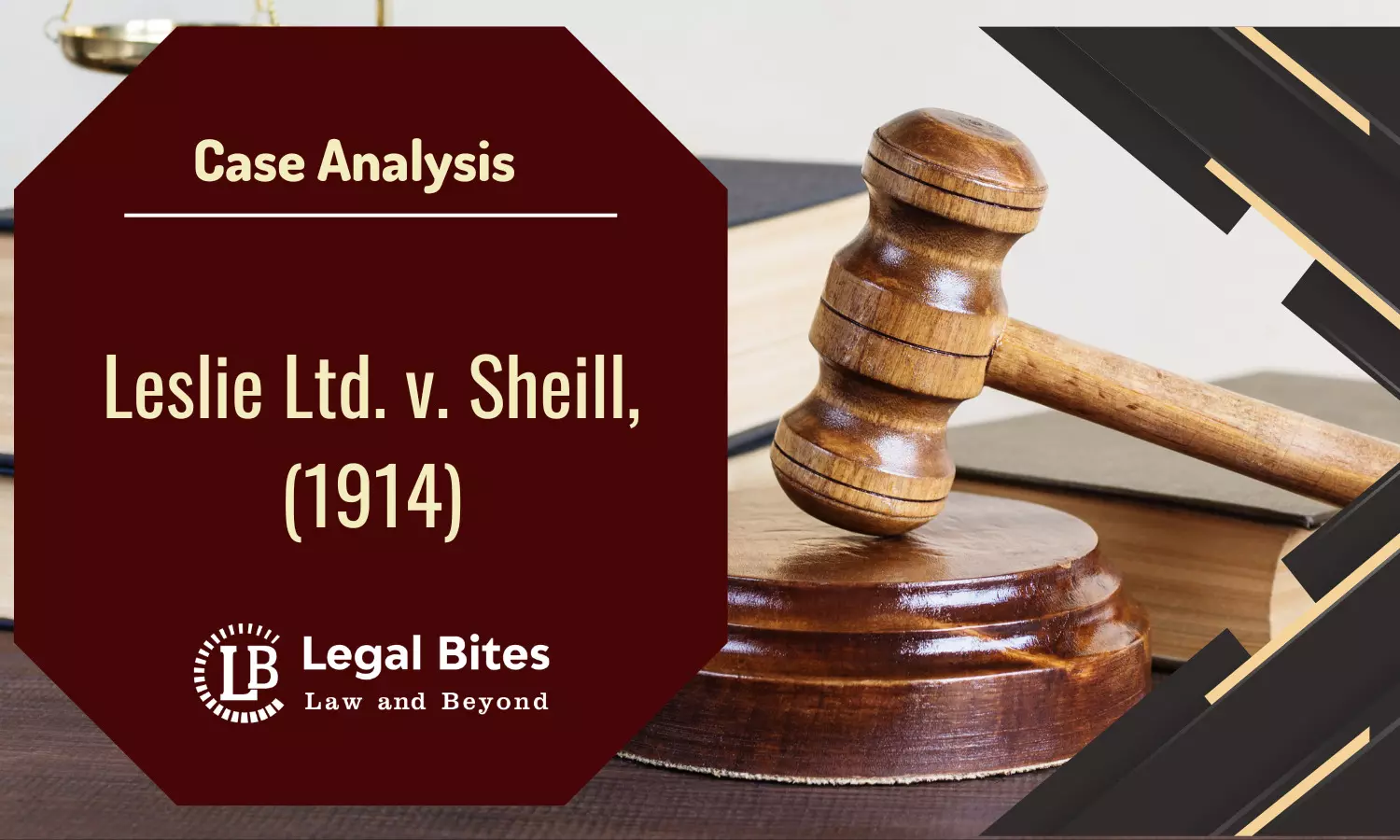Case Analysis: Leslie Ltd. v. Sheill, (1914) | Contractual Capacity of Minors
This case analysis explores the pivotal legal principles established in Leslie Ltd. v. Sheill and their broader implications in contractual relationships.

This case analysis explores the pivotal legal principles established in Leslie Ltd. v. Sheill and their broader implications in contractual relationships.Case Title: Leslie Ltd. v. SheillCitation: (1914) 3 K.B.607IntroductionContracts are written documents which act as the basis of many forms of relationships between parties involved, outlining each of their rights and duties, what they are entitled to and what they are not. Contracts have aided in the proliferation of global trade,...
This case analysis explores the pivotal legal principles established in Leslie Ltd. v. Sheill and their broader implications in contractual relationships.
Case Title: Leslie Ltd. v. Sheill
Citation: (1914) 3 K.B.607
Introduction
Contracts are written documents which act as the basis of many forms of relationships between parties involved, outlining each of their rights and duties, what they are entitled to and what they are not. Contracts have aided in the proliferation of global trade, employment, finance operations and many other such areas, where the formation of a contract is the first step to commencing any form of fiduciary relationship between parties.
Depending upon the nature of the contract, it may be termed differently and would also have different effects on the parties involved.
Diving a step deeper, examining a contract to determine its validity/enforceability involves a variety of components that are cumulatively considered to conclude whether or not a contract is valid and therefore enforceable before a court of Law. The determining factors as such, are the essentials of a valid contract (Section 10 of the Act), of which some are as follows: offer and acceptance, capacity of the parties to contract, consideration, lawful object, free consent etc.
There are various kinds of contracts, some of them are:-
1) Valid Contracts: These contracts are valid and enforceable before a court of Law.
2) Void Contracts: These contracts, also termed contracts void ab initio, are of such a nature that they never made it past the stage of a mere agreement, which also was not valid and thus these contracts are not legally binding on the parties and thus are not enforceable.
3) Voidable Contracts: These are Contracts that possess validity/enforceability but subsequently due to certain legal defects (either in the formation of the Contract or through breach committed by Parties) the Contract becomes Void at the option of any of the Parties involved. As mentioned in the word itself, they are voidable, implying that they can be rendered void at the behest of the aggrieved party.
The Present case of Leslie Ltd v. Sheill, (1914) is an example of a void ab initio contract, as will be further discussed.
Facts of the Case
Leslie Ltd v. Sheill (1914) is a notable case in the realm of contract law, particularly concerning the principles of offer and acceptance and the capacity of parties to contract. The primary cause of action arose when to secure a loan of 400 Euros from the plaintiff, the defendant misrepresented his age during the transaction. Despite being a minor, the defendant spent the entire loan without making any repayments.
Consequently, the plaintiff filed a lawsuit against the defendant to recover the money owed. The plaintiff cited Sections 11 and 13 of the Indian Contract Act and Sections 115 of the Indian Evidence Act in support of their complaint. This case gained prominence as it established the foundation for the doctrine of equitable restitution.
Issues of the Case
- Whether the Minor is liable for the amount borrowed and not repaid, and whether such liability entitles the defendant to equitable restitution against the loan.
- Whether the Defendants can pursue restitution via a tort claim stemming from the contract or through quasi-contractual assertions.
Laws of the Case
1) Sections 10, 11 and 13 of the Indian Contract Act, 1872
Section 10: What agreements are contracts:
All agreements are contracts if they are made by the free consent of parties competent to contract, for a lawful consideration and with a lawful object, and are not hereby expressly declared to be void.”
Section 11: Who are competent to contract:
Every person is competent to contract who is of the age of majority according to the law to which he is subject, and who is of sound mind, and is not disqualified from contracting by any law to which he is subject.
Section 13: Consent defined:
Two or more persons are said to consent when they agree upon the same thing in the same sense.
2) Section 115 of the Indian Evidence Act, 1872
"When one person has, by his declaration, act or omission, intentionally caused or permitted another person to believe a thing to be true and to act upon such belief, neither he nor his representative shall be allowed, in any suit or proceeding between himself and such person or his representative, to deny the truth of that thing."
Analysis of the Case
In the context of Leslie Ltd v. Sheill (1914), the aspect of the minor as a competent party to a contract is a notable consideration. A minor, typically defined as an individual under the age of majority, lacks the legal capacity to enter into binding contracts in many jurisdictions. This principle is based on the rationale that minors may not possess the requisite maturity and understanding to fully comprehend the implications of their contractual obligations.
In general, contracts entered into by minors are considered voidable at the option of the minor. This means that a minor has the right to either affirm or disaffirm a contract they have entered into, typically within a reasonable time after reaching the age of majority. If a minor chooses to disaffirm the contract, they are generally entitled to have any consideration they provided returned to them, and they are relieved of their contractual obligations.
However, there are exceptions to the rule regarding minors' capacity to contract. In certain circumstances, minors may be bound by contracts involving necessities such as food, shelter, clothing, or medical care. Additionally, contracts for necessaries may be enforceable against a minor to the extent that they are reasonable and beneficial to the minor's well-being. Thus, Sheill being a minor, and his ability to enter into a binding contract with Leslie Ltd is subject to scrutiny.
Upon the Plaintiff's failed attempts to recover the money and claim for damages through interest, it may be observed through the arguments of the Plaintiffs, resorting to action through the Doctrine of Restitution, that the Plaintiffs pleaded for a return of money under a quasi-contract before the Court. Lord Sumner replied,
"When the cause of action is ex contractu or is so closely related to the contract that it would be an indirect means of enforcing the contract, Infant cannot be held responsible for the wrong. However, an infant may be held accountable if the wrongdoing is related to the contract’s subject matter but is distinct from it in that it was not an action that was anticipated by the contract.”
Furthermore, reliance was also placed on the case of Jennings v. Rundall, (1799) to assert that a party to a suit cannot pray to a Court of Law to convert a contract into a tort, to open up the avenue of suing an infant. Lord Sumner also went on to state that since the Minor had probably spent all of the loan money and thus there was no trace of it in his possession meaning that there was no possibility of it being restored, he (the minor) could only be compelled to repay an equivalent sum of money to the Plaintiffs. But, according to Lord Sumner, this would be nothing but enforcing a void contract.
Thus, in the present case, the minor was discharged of all allegations and apparent liability involved with the contract and its execution. On both grounds contended by the Plaintiffs, a tort or quasi-contractual claim in the current situation would equate to enforcing the contract by holding the defendant accountable for damages or repayment, hence no such action was warranted.
Conclusion
Overall, the minor's competence to contract is a fundamental consideration in contract law. While minors are generally not bound by their contractual agreements, there are exceptions to this rule, particularly in cases involving necessaries. Understanding the legal principles surrounding minors' capacity to contract is essential for ensuring fairness and enforceability of contractual agreements involving individuals under the age of majority.

Aryan Udani
Aryan's key areas of interest are Environmental Law, Intellectual Property Law and Mergers & Acquisitions Law. Institution: Christ University
